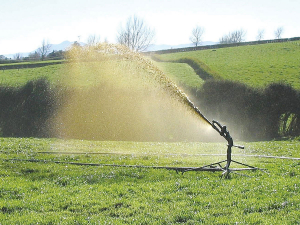$52,500 fine for effluent mismanagement
A Taupiri farming company has been convicted and fined $52,500 in the Hamilton District Court for the unlawful discharge of dairy effluent into the environment.
 Spreading effluent solids requires specialist machinery suited to the type of effluent being spread.
Spreading effluent solids requires specialist machinery suited to the type of effluent being spread.
Good effluent management combines a well-designed effluent system with processes for collecting effluent and applying it to pasture in the right quantities at the right time.
Onfarm benefits of good management include:
- Fertiliser savings
- Improved soil condition
- Prevention of animal health issues
- Compliance with council rules or resource consent.
The key to good decisionmaking is understanding the soil water deficit as essential to prevent ponding and run-off and to avoid applying effluent to saturated soils.
Soil water deficit is the amount of effluent which can be applied to the soil before it reaches field capacity (the amount of water held in the soil after excess water has drained away). If effluent is added at field capacity it will likely result in ponding, runoff or leaching.
The average dairy cow produces about $25 worth of nutrients annually as farm dairy effluent (FDE), according to DairyNZ.
For a 400 cow dairy herd this represents about $10,000 of nutrients annually. Using these FDE nutrients effectively will greatly reduce the fertiliser bill.
Spreading effluent solids requires specialist machinery suited to the type of effluent being spread.
Using a local contractor to spread the effluent solids may be an option. Alternatively, you can hire or buy machinery to do it yourself. Vehicle spreading provides the flexibility to apply effluent in areas where the effluent irrigation system cannot reach. It can also be used for a nutrient boost prior to sowing a crop or applied on silage and hay paddocks.
For more than 50 years, Waireka Research Station at New Plymouth has been a hub for globally important trials of fungicides, insecticides and herbicides, carried out on 16ha of orderly flat plots hedged for protection against the strong winds that sweep in from New Zealand’s west coast.
There's a special sort of energy at the East Coast Farming Expo, especially when it comes to youth.
OPINION: The latest reforms of local government should come as no surprise.
The avocado industry is facing an extremely challenging season with all parts of the supply chain, especially growers, being warned to prepare for any eventuality.
Rural recycling scheme Agrecovery is welcoming the Government's approval of regulations for a nationwide rural recycling scheme for agrichemicals and farm plastics.
Despite a late and unfavourable start, this year’s strawberry crop is expected to be bountiful for producer and consumer alike.